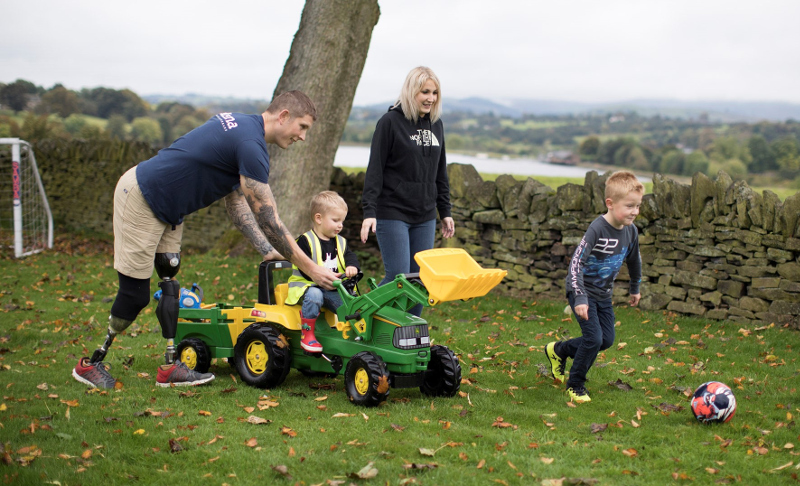
Pioneering research has revealed that a radical new approach could improve the lives of ex-Service personnel and their families and create significant savings across the NHS…
Findings from a groundbreaking report identify the need for changes in the way support is given to people with limb loss, their families and carers. The challenge of coping with the physical and mental aspects of caring can put a tremendous strain on the family unit and they may feel lost and unsupported, the study highlights.
The project commissioned by Blesma and funded by The Forces in Mind Trust was undertaken by the Veterans and Families Institute for Military Research at Anglia Ruskin University. The report, which will be distributed to professionals in health, social and care services and the charity sector, recommends an overhaul of current support systems to pay more attention to family needs.
“The recommendations from this report could have a huge impact on the lives of military families but limb loss also affects the general public with more than 7,000 amputations being performed every year, mainly from vascular conditions,” says Barry Le Grys MBE, Chief Executive of Blesma.
“Limb loss obviously changes families’ lives and their welfare can suffer. When a partner or close family member becomes primary carer there is a huge shift in parameters which can lead to a range of problems. We believe that by listening to the families, we can enhance their wellbeing and alleviate a huge burden on the NHS.”
Ray Lock, Chief Executive of the Forces in Mind Trust, said: “One of the founding principles of FiMT is ‘to promote better mental health and well-being’ for ex-Service personnel and their families. This report for Blesma highlights the necessity of considering the impact of coping with limb loss on the wider family unit, as too often carers’ well-being is overlooked.”
Blesma, which was founded in the aftermath of WW1, supports hundreds of limbless veterans and helps them lead independent lives. Over their 100 years Blemsa have developed an unrivalled insight into living with limb loss.
“Blesma has always known through experience that the family is crucial to recovery and rehabilitation, and we sought hard evidence. The message is loud and clear that they need help too,” added Heather Betts, Director of Independence and Wellbeing at Blesma, which commissioned the 18-month study.”
“We discovered that partners and family members often feel that support is directed to the veteran and that their needs may not be fully considered nor understood by health services. Typically, they don’t make a fuss because they are focused on caring for their loved one.
“Caring is not often talked about, rather it is a practical activity that is done but not discussed. However, not talking to or helping carers could lead to greater problems in coming years.”
The ‘Caring and Coping: The Family Perspective on Living with Limb Loss’ study involved interviews with 72 Blesma Members and their families to get a unique insight into life with limb loss. (The survey sample excluded veterans from Iraq and Afghanistan, focusing on a cohort who have not had the benefit of modern and comprehensive recovery pathways.)
The key recommendations, which address gaps that are personal, detailed and tied to the challenges of everyday living, will be circulated to medical and welfare organisations to encourage changes in healthcare provision for all families caring for someone with limb loss.
The report sets down tactical frameworks acknowledging that subjects and their carers can be in very ‘different places’ physically and emotionally on the recovery timeline.
Senior Research Fellow, Dr Hilary Engward, who conducted the research said: “When it comes to staying healthy, the main focus is perhaps obviously on the veteran. However, the carer could also be suffering from health conditions but, because they are so busy caring for their loved one, they neglect to look after themselves.
“The study found a very strong military ethic that you just get on with things and don’t complain meaning that families were compromising their own health in the process. There is an overwhelming need to recognise that the veteran and their carer will cope differently.”
Blesma believes the report will have huge benefit for the families of the 7,370 people whose diabetes results in an amputation (according to Diabetes UK). Data published by Public Health England and the National Cardiovascular Intelligence Network, revealed the 25,527 major and minor amputations reported during the period 2013 to 2016 to be a record high.
The full report can be read at www.blesma.org/familiesproject

